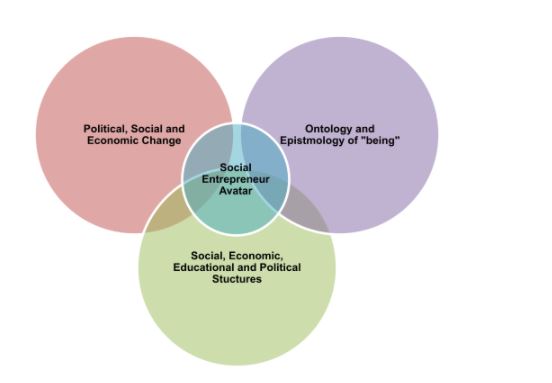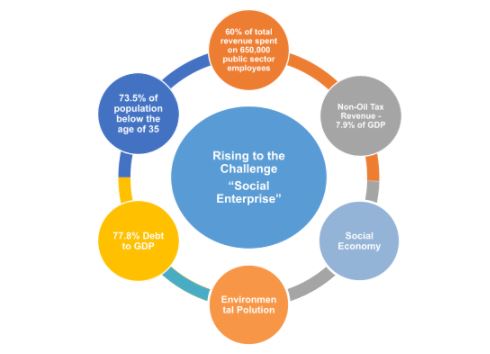The Quiet Revolution: The power of social enterprise
Social enterprise has become growing concept in the global world. Institutions have championed the importance of social enterprise/social entrepreneurship within a public policy context globally, nationally, regionally and locally.
The aim of this brief article is to discuss the importance of social enterprise as a key problem solver in dealing with the key economic and social economic problems in society within the context of Ghana.
The authors of this work are currently undertaking a funded Innovation for African Universities Programme project with the British Council; the key focus of the research is to see how social enterprise can be better integrated into economic development in Ghana from a higher education policy perspective.
Social Enterprise as Problem Solver
Social enterprise is a term that sparks great debate when an all-embracing definition is attempted.
This is, in part, due to its multi-faceted nature, cultural and social variances, and the complexities of the numerous social, economic and psychological influences upon the notion of social enterprise. The authors of this article view social enterprise as an altruistic, social and economic movement that drives an innovative response to a pressing societal challenge that may be local, regional, national or global, and there is a clear impetus to develop social enterprise globally, generated by COVID-19.
This has been fuelled by the view of the World Health Organisation (WHO) (2020), which emphasises the crucial role that social enterprise and social entrepreneurs will play in the current global health crisis, asserting that in order for society to build a new normal, social enterprise and social entrepreneurs must step up to the challenge presented.
The response of the social entrepreneur is critical and cannot be overstated. Social enterprises are fundamental pillars of the “new normal,” and as Oberoi, Halsall, and Snowden (2021) assert, the skills and capabilities of the social entrepreneur will be challenged to their utmost.
Recently, Snowden, Oberoi and Halsall (2021) have proposed the development of a new social entrepreneur avatar that illustrates the key skills and qualities that are fundamental to the successful social entrepreneur within this developing new normal. Whilst it is beyond the remit of this article to explore these in depth, it is appropriate to highlight these key features: creativity, empathy, resilience, optimism, mentorship, being solution focused, heutagogy and holism.
Social enterprise cannot be separates from the political, social and economic systems of sovereign states. Social enterprise within Ghana is no exception to this.
Socio-economic inequalities disproportionately impact the life chances of Ghanaian young people. With an average national unemployment rate of 5%, unemployment among the youth (aged 15-35) is much higher at 12%, with an additional 28% categorised as discouraged workers.
In the absence of unemployment benefits, unemployment is simply not an option for most people, particularly the youth who turn to the informal sector to earn an income.
One in three young people in Ghana are self-employed in vulnerable jobs. It is estimated 230,000 Ghanaians seek to enter the labour market annually; the formal economy is able to offer jobs to about 2%, and, consequently, 225,000 are left without employment (Dadzie, Fumey and Namara, 2020). Of those employed, about 50% are underemployed or underutilised as they lack entrepreneurial skills. Furthermore, the current infrastructure is prohibitive to start-up and small- to medium-scale enterprises. This has an adverse effect upon socio-economic development, exacerbated by the impact of COVID-19.
With the consequent/related global economic recession, an innovative approach is needed to equip the labour force with appropriate employability skills..
The COVID-19 pandemic requires communities to be responsive and strive towards developing sustainable solutions. Universities have a role to play in this process: firstly, by embedding enterprise initiatives within curricula and developing social entrepreneurial skills, and secondly, to support social enterprises by providing a pool of expertise for social entrepreneurs to draw upon.
The World Bank (Dadzie, Fumey and Namara, 2020) identifies agribusiness, entrepreneurship, apprenticeships, construction, tourism and sports as key sectors that can offer increased employment opportunities for the Ghanaian youth. Ghanaian universities have failed to establish societal skill development in these areas, specifically failing to provide career guidance and counselling, work-based learning, entrepreneurship, coaching, and mentoring to equip young people with the skills needed for work and the skills associated with the QS global skill framework.
To address these challenges, the higher education sector must rethink and re-evaluate programs and teaching/coaching approaches.
To conceptualise this approach, the authors of this article suggest the following model:

This model illustrates the complexity of social enterprise and the factors affecting the social entrepreneur. The social entrepreneur is the centre of this process and is represented by the social entrepreneur avatar postulated by Snowden et al. (2021).
The entrepreneur’s actions and response to change are dependent upon existing social, educational and political structures, as well as the nature of “being human”. In turn, their response is dependent upon their socio-cultural values, social personality and experiences – sharing their epistemological and ontological self.
Thus, it is proposed that a successful social entrepreneur responding to societal and economic challenges needs to acknowledge each of the dependent components of their potential practice. Oberoi, Halsall and Snowden (2019) advise that social enterprise is an idea whose time has come, and that successful social enterprises are based upon successful social entrepreneurs. The impact and contribution of social enterprises in the development of global society and local communities should not be underestimated.
Rising to the Challenge
Ghana’s population is 30.8 million according to the 2021 Population and Housing Census (PHC). Since the first post-independence census in 1960, the population has increased nearly fivefold.
From 24.7 million in 2010, the population has grown by 6.1 million, representing an annual intercensal growth rate of 2.1%. 73.5% of Ghana’s population are below 35, with 38.2%between 15–35 years old (Ghana Statistical Service, 2021).
This figure further emphasises the country’s unemployment rate and the growing need to equip the youth with employability skills. Social enterprise will provide economic, political, social and environmental solutions for the country, as shown in Figure 2 below.

Seeking work remains a core criterion for defining unemployment. The effect of unemployment transcends individual-level effects and yields adverse consequences for both a society with a high unemployment rate the country’s economic trajectory. Again, youth unemployment is becoming an apparent feature of the economies of many developing countries. The youth unemployment situation in Ghana is said to be growing at an alarming rate. In Ghana, the unemployment rate is about 4.6 per cent and is primarily dominated by females compared to their male counterparts (GSS, 2021). The International Labour Organisation (ILO, 2012) has observed a severe mismatch between the skills possessed by young workers and those demanded by employers. Ghanaian job seekers have been described as well-educated but suffering from skills mismatch (Dawes and Marom, 2013).
According to Baah-Boateng (2004), the implementation of stabilisation and structural adjustment policies in many sub-Saharan African countries over the last two decades was meant to be a vehicle for enhancing economic growth and development. However, the impact of these programmes on unemployment has been minimal in the short run or has been weak due to the partial and fragmented nature of the policies during their implementation process. The rewards anticipated as a result of these policies failed to materialise, and these failings cause a ripple effect leading to further economic problems and the entrenchment of issues related to unemployment and poverty.
According to The World Bank’s development indicators, the number of graduates from tertiary education in Ghana was reported at 109,874 people of both sexes in 2018. Companies are not increasing in number as compared to the rate of tertiary graduates, creating severe unemployment. COVID-19 has exacerbated this issue.
The devastating effect of COVID-19 has been extraordinary, with nothing like it since WWII, when $18 to 20 trillion was used by G20 countries globally to protect lives and livelihoods and stimulate the economy. The unemployment situation post-COVID has worsened. Ghana was not spared either from the shock waves of the COVID-19. In the aftermath, the Ghanaian Government must attempt to revive, restructure and stimulate the economy back on to the growth path.
Employment growth in Ghana appears to lag behind its economic growth over the years, and social entrepreneurship is one of the surest ways to solve the unemployment bane of the youth while at the same time championing the government’s post-pandemic recovery. Social enterprise leads to job creation, improves government revenue through taxes, improves the capacity of local industries, and stimulates the economy’s growth. Social enterprise can have a positive impact on the economy, primarily as the Government seeks to increase investment for entrepreneurship in the 2022 Budget statement of the theme “Building a Sustainable Entrepreneurial Nation: Fiscal Consolidation and Job Creation”. Social entrepreneurship will be at the forefront of the country’s quest to promote the building blocks for an inclusive and sustainable post-COVID-19 recovery.
The term “social enterprise” is commonly used to describe a group of organisations with primarily social goals yet make a large portion of their revenue by selling goods or services (Vickers, 2010). Social enterprises intensify the concept of social economies regarding the scope and scale of their operations to reduce the cost-related impact of environmental pollution. As the world goes green with the 2021 United Nations Climate Change Conference, more commonly referred to as COP26, social enterprise becomes a two-edged sword to solve the unemployment problem while protecting the environment.
Conclusion
As there has been a great increase in the understanding of the importance of social enterprise and social entrepreneurs globally, the purpose of this paper was to unravel social enterprise within the context of Ghana. The authors viewed social enterprise as an approach that leads to innovation, resilience and an answer to some social and economic problems. It acknowledged the societal challenges and problems brought about by COVID-19 adding to the already existing economic and health issues. The COVID-19 pandemic’s impact on the global economy has left some communities struggling for survival, especially in less developed countries. With the rise of unemployment and lack of employability skills, especially amongst the youth in Ghana, social enterprise seems a golden opportunity to build a sustainable society and an inclusive economy.
By teaming up with various stakeholders, designing programmes and highlighting the socio-economic problems, the authors regarded social enterprise as a means to create job opportunities, combat unemployment, equip Ghanaian youth with employability skills and improve the local economy in Ghana. Collaboration between higher education and local authorities, as well as encouraging young people to get involved in social enterprise, has been one of the drivers for championing this study. All in all, social enterprise and social entrepreneurship are perceived as the vehicles for employability and future economic growth.
The authors of this article are keen to talk to key stakeholders who are actively involved in social enterprise/social entrepreneurship. Information about the authors can be found at the end of the article, so please feel free to get in touch.
References:
Baah-Boateng, W. (2004). Employment Policies for Sustainable Development: The Experience of Ghana,
(Accessed: 12th December 2021).
Dadzie, C. E., Fumey, M. and Namara, S. (2020). Youth Employment Programs in Ghana: Options for Effective Policy Making and Implementation. International Development in Focus. World Bank:Washington, DC.
Weblink: https://openknowledge.worldbank.org/handle/10986/34349
(Accessed: 23rd November 2021).
Daves, L. and Marom, R. (2013). Mobile Services for Youth Employment,
(Accessed: 23rd November 2021).
Ghana Statistical Service. (2021). Population and Housing Census
ILO (2004). Working Out of Poverty in Ghana. The Ghana Decent Work Pilot Programme. Geneva: International Labour Office.
Oberoi, R., Halsall, J. P. and Snowden, M. (2021). Reinventing Social Entrepreneurship Leadership in the COVID-19 Era: Engaging with the New Normal. Entrepreneurship Education, Vol. 4, pp. 117–136. https://doi.org/10.1007/s41959-021-00051-x
Oberoi, R., Halsall, J. P. and Snowden, M. (2020) A New Era of Social Enterprise? A Global Viewpoint. International Journal of Entrepreneurship and Economic Issues, Vol. 4(1), pp. 79-88.
Oberoi, R., Halsall, J. P. and Snowden, M. (2019). Social Entrepreneurship: An Idea Whose Time has Come. India Corporate Sustainability and Responsibility.
Weblink: https://indiacsr.in/social-entrepreneurship-an-idea-whose-time-has-come/
(Accessed: 8th December 2021).
Snowden, M., Oberoi, R. and Halsall, J. P. (2021). Reaffirming Trust in Social Enterprise in the COVID-19 Era: Ways Forward [Special issue]. Corporate Governance and Sustainability Review, Vol. 5(1), pp. 120-130. https://doi.org/10.22495/cgsrv5i1sip3
Vickers, I. (2010). Social Enterprise and the Environment: A Review of the Literature. Third Sector Research Centre Working Paper, 22.
Authors:
Josiah Nii Adu Quaye is an Assistant Lecturer in the Accounting and Finance Department at Accra Technical University, Ghana. His research interests lie in the fields of forensic accounting and auditing, finance, taxation, social policies and social enterprise. He is a qualified accountant and a member of the Institute of Chartered Accountants, Ghana (ICAG).
Email: jnquaye@atu.edu.gh
Michael Snowden is a Senior Lecturer in Mentoring Studies in the School of Human and Health Sciences at the University of Huddersfield, UK. His research interests lie in the fields of pedagogy, mentorship, social enterprise, curriculum enhancement, and learning. Michael is a regular speaker at national and international conferences concerned with the development of pedagogical strategies in various contexts.
Email: m.a.snowden@hud.ac.uk
Ernest Christian Winful is a professionally astute Senior Lecturer and a Certified Research Fellow with 19 years of experience in providing comprehensive high-quality teaching. He has over 20 published articles and conference presentations to his credit. His area specialty is financial market management.
Email: ewinful@atu.edu.gh
Jamie P. Halsall is a Reader in Social Sciences in the School of Human and Health Sciences at the University of Huddersfield, UK. His research interests include communities, globalization, higher education, public and social policy. Currently, Jamie is a Fellow of the Royal Society of Arts, a Chartered Geographer of the Royal Geographical Society, and was awarded Senior Fellowship of the Higher Education Academy in January 2017.
Email: j.p.halsall@hud.ac.uk
Denis Hyams-Ssekasi is a Lecturer in Business and Management at the Institute of Management at the University of Bolton, UK. His research interests include: social enterprises and entrepreneurship, intercultural communication, internationalization and high performance work systems. Denis is currently a member of the Institute for Small Business and Entrepreneurship as well as a Senior Fellow of the Higher Education Academy.
Email: D.Hyams-Ssekasi@bolton.ac.uk
Frank Frimpong Opuni is a Senior Lecturer at the Department of Marketing within the Faculty of Business at Accra Technical University, Ghana. He is also a PhD Candidate at the University of Bolton, UK. His research interests lie in the areas of social, digital and services marketing. He was admitted as a fellow of the Global Strategic Management Institute, Michigan in 2013 and is also an Associate Member of the Chartered Institute of Marketing, Ghana.
Email: fofrimpong@atu.edu.gh



